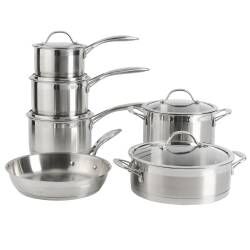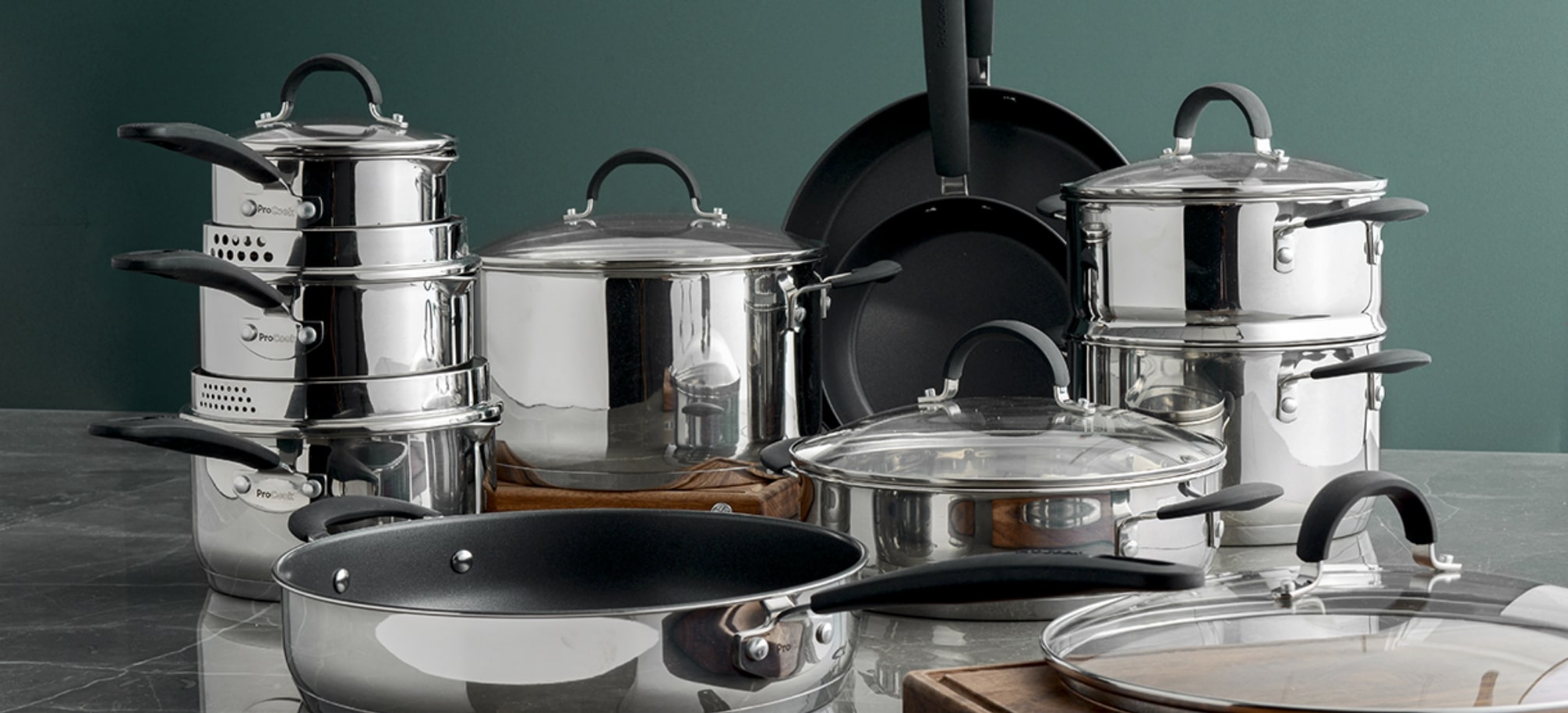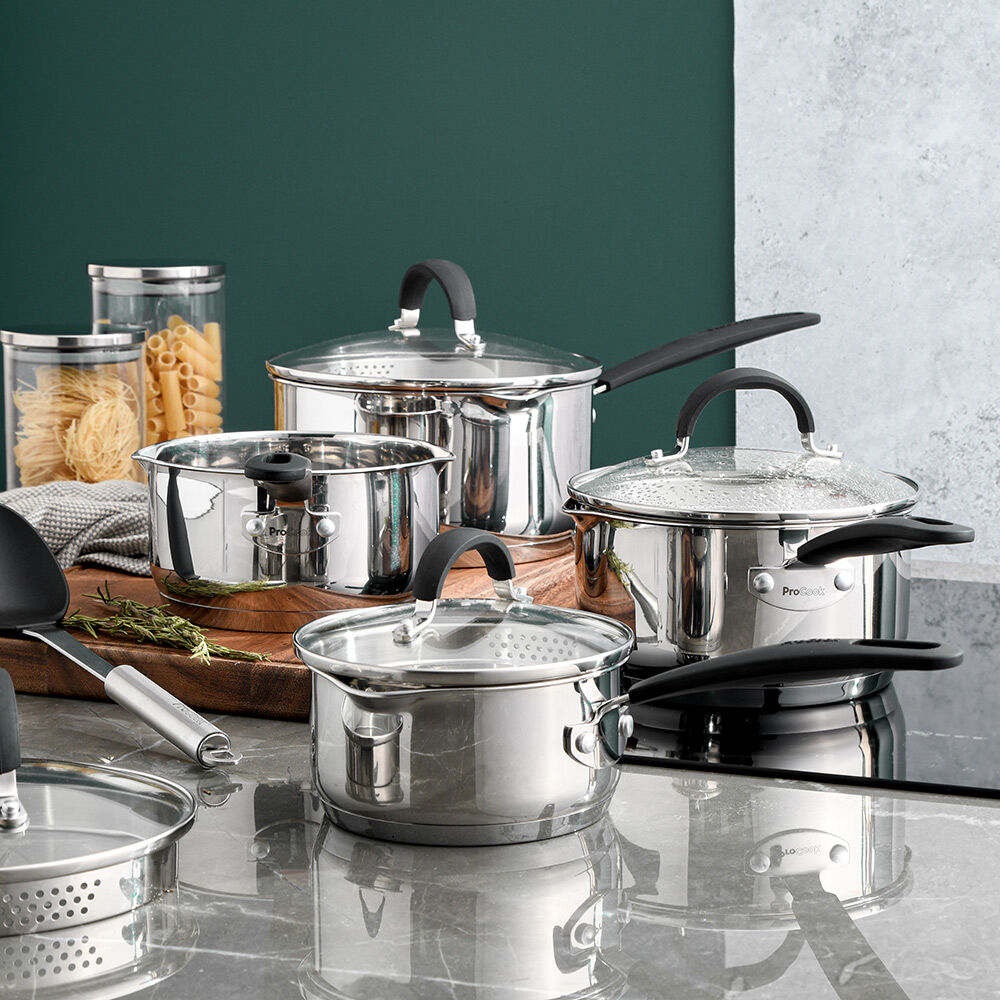ProCook Help Hub
The latest inspiration and advice from the experts at ProCook
Whether you're new to cooking or consider yourself a master chef, a good quality set of pots and pans is an important piece of kit. Although, deciding on which pots and pans are best for you can be a difficult task.
With many different materials and surface coatings to choose from, finding the right pan set is important. Our guide explores each coating, from non-stick to uncoated, as well as different cooktops, so you can cook comfortably with your chosen cooking vessel.
Different Cooktop Types
Induction
There are various benefits to cooking on an induction hob: efficiency, quicker heat up, energy saving, easy to clean, and much more. Although, for an induction hob to work to its best potential, induction compatible pans are essential. Using pans that are not built for induction cooktops will either have poor conductivity or not work at all.
Every piece of ProCook cookware is induction compatible and built with a full induction base for incredible heat conductivity and the elimination of hot spots.
Ceramic
Made from a ceramic glass with a heating component underneath, a ceramic hob is relatively easy to clean and is compatible with all pot and pan types.
Gas
All cookware is compatible with gas hobs, although you need to be careful when cooking, avoiding high flames from crawling up the sides of the cookware.
What are the Different Pan Coatings?
Non-Stick
There are many benefits of cooking with non-stick. As the name suggests, there's a non-stick coating that, well, aids in creating a non-stick surface which reduces the risk of ingredients sticking to the pan. You can also create fantastic tasting meals with less oil while benefiting from uniform heat distribution and easy cleaning.
We use a ceramic, toxic-free non-stick coating which possesses all the above benefits. With full non-stick coverage, our non-stick pans are easy to use, simple to clean and perfect for use on any heat source including induction.
Uncoated
Uncoated pans have no coating as all and are popular amongst professional and home kitchens. With no coating being present, you can cook on a higher heat, which is perfect for searing, browning and achieving that crispy texture.
Our uncoated pans build heat quickly, distributes evenly and eliminates hot spots for perfect, chef-like cooking.
Types of Pots and Pans and their Uses
Saucepans
- More than sauces: use to boil water for pasta or rice
- Perfect for cooking soups, stews and sauces from scratch
- Great for heating up pre-made soups and sauces too
Frying Pans / Skillets
- Fry, sear and brown till your heat's content
- Shallower base than a sauté pan, which has higher sides
- Can come non-stick or uncoated
- Perfect for frying veggies, fish and meats
- Great for cooking eggs
Woks
- Deep, well-rounded sides and a smaller surface area makes the wok ideal for quick cooking at a high heat
- Perfect for classic Asian dishes like stir fries, tofu, chow mein and more
Griddle Pans
- A ridged surface area so you can achieve those delicious brown marks on your ingredients
- Can promote healtheir cooking as the fat drips off the ingredients and sits at the bottom
Sauté Pans
- Ideal for browning meats and vegetables
- Great for reducing sauces, cooking risottos and more
- Featuring straight sides for a larger surface area
- Can come with a lid to retain moisture when slow cooking
Casserole Dishes
- Multipurpose: use on the stove or in the oven
- Perfect for searing meat as well as cooking stews, soups and casseroles
- Two handles for easy lifting and a lid to lock in moisture
Stock Pots
- Great for cooking on the hob and conventional oven use
- Traditionally used for making stocks but can also be used to make soups, sauces and batch meals like chilli
- Usually comes with a lid for slow cooking
- Two handles for easy lifting
Paella Pans
- Wide and shallow for maximum surface area coverage, so the liquid can evaporate
- Traditionally made from carbon steel
- Ability to cook through a thin layer of rice without leaving behind water


 Electricals
Electricals
 Coffee
Coffee
 Mixers and Blenders
Mixers and Blenders
 Kettles and Toasters
Kettles and Toasters
 Cooking
Cooking
 Small Appliances
Small Appliances
 Cookware & Bakeware
Cookware & Bakeware
 Baking
Baking
 Roasting
Roasting
 Pots and Pans
Pots and Pans
 Speciality Cookware
Speciality Cookware
 Knives
Knives
 Knife Sets
Knife Sets
 Single Knives
Single Knives
 Knife Accessories
Knife Accessories
 Tableware
Tableware
 Dinner Sets
Dinner Sets
 Serveware
Serveware
 Table Accessories
Table Accessories
 Outdoor Dining
Outdoor Dining
 Drinkware
Drinkware
 Hot Drinkware
Hot Drinkware
 Cafetieres and Teapots
Cafetieres and Teapots
 Drink Accessories
Drink Accessories
 Accessories
Accessories
 Kitchen Utensils
Kitchen Utensils
 Tools and Gadgets
Tools and Gadgets
 Storage
Storage
 Cleaning
Cleaning
 Easter Offers
Easter Offers
 Offers
Offers
 Clearance
Clearance
 Gifting
Gifting

